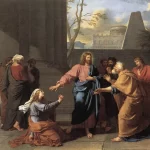Primary Scriptures:
- Luke 16:19-31
Main People:
- Jesus Christ: The Teacher
- Pharisees (Listeners of the parable)
- Lazarus: A poor man covered in sores, representing humility and suffering.
- The Rich Man: Symbolizes wealth, self-indulgence, and spiritual blindness.
- Abraham: Represents the righteous, who understand and live by God's teachings.
Main Themes:
- Consequences of Earthly Choices
- Reversal of Fortunes in the Afterlife
- Importance of Scripture and Prophecy
- Hypocrisy and Spiritual Blindness
Main Places:
- Rich Man's Home: Symbol of earthly wealth and temporary pleasures.
- Hades: A place of torment, representing the consequences of a life lived without regard for God's Word.
- Abraham's Bosom: Symbolizes comfort and salvation for the righteous.
Study Keywords:
- Lazarus
- Rich Man
- Afterlife
- Wealth
- Poverty
- Prophecy
- Pharisees
- Resurrection
The Parable of Lazarus and the Rich Man, found in Luke 16:19-31, is a poignant narrative that Jesus Christ used to convey profound spiritual truths. This parable, distinct in its detail and imagery, is a powerful illustration that reveals insights into the afterlife, the consequences of earthly choices, and the hard-heartedness of the Pharisees.
The narrative begins by contrasting the lives of two men: a nameless rich man, who lives in opulence, and Lazarus, a poor man covered in sores, longing for scraps from the rich man’s table. After their deaths, their roles are dramatically reversed. Lazarus is comforted in Abraham’s bosom, a depiction of paradise, while the rich man suffers in Hades, a place of torment. This reversal of fortunes highlights the temporary nature of earthly wealth and status.
A key element in this parable is the dialogue between the rich man and Abraham. The rich man, realizing his dire state, pleads for Lazarus to be sent back to warn his brothers, hoping to prevent them from sharing his fate. Abraham’s response is crucial: “They have Moses and the Prophets; let them hear them.” Even when the rich man insists that a resurrection would convince them, Abraham asserts, “If they do not hear Moses and the Prophets, neither will they be convinced if someone should rise from the dead.” This statement directly addresses the Pharisees’ refusal to believe in Jesus, indicating that their unbelief would persist even in the face of resurrection.
The depth of this parable lies in its multi-faceted teachings. Firstly, it warns against the dangers of materialism and self-indulgence, emphasizing that earthly riches do not guarantee eternal comfort. It also highlights the importance of heeding God’s Word, as revealed through the Scriptures, and responding with faith and repentance.
Furthermore, the parable subtly rebukes the Pharisees for their spiritual blindness and hypocrisy. Despite their knowledge of the Scriptures, they fail to recognize Jesus as the fulfillment of prophecy. This parable, therefore, serves as a stark reminder of the futility of relying on religious rituals and heritage for salvation, instead of developing a genuine relationship with God.
Historical Context
During Jesus' time, the Pharisees were a dominant religious group known for their strict adherence to the Law of Moses. However, they often missed the Spirit of the law due to their focus on outward religiosity. This parable directly challenges their understanding of righteousness, wealth, and the afterlife, contrasting it with Jesus' teachings of true spiritual wealth.
Literary Context
This parable is unique to the Gospel of Luke and is part of a series of teachings and parables directed at the Pharisees. Luke's Gospel often emphasizes social justice, the dangers of wealth, and the need for repentance.
References
- The Holy Bible, Luke 16:19-31.
- Barclay, William. "The Gospel of Luke." The New Daily Study Bible.
- Bock, Darrell L. "Luke." The IVP New Testament Commentary Series.
- Keener, Craig S. "The IVP Bible Background Commentary: New Testament."
- Stein, Robert H. "Luke." The New American Commentary.









